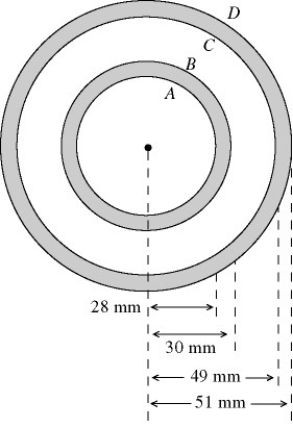Multiple Choice
Lines of charge: The cross section of a long coaxial cable is shown in the figure, with radii as given. The linear charge density on the inner conductor is  and the linear charge density on the outer conductor is
and the linear charge density on the outer conductor is  The inner and outer cylindrical surfaces are respectively denoted by A, B, C, and D, as shown.
The inner and outer cylindrical surfaces are respectively denoted by A, B, C, and D, as shown.  The magnitude of the electric field at a point that is
The magnitude of the electric field at a point that is  from the axis is closest to
from the axis is closest to 
A) 17,000 N/C.
B) 15,000 N/C.
C) 13,000 N/C.
D) 11,000 N/C.
E) 9600 N/C.
Correct Answer:

Verified
Correct Answer:
Verified
Q16: Spheres of charge: Electric charge is uniformly
Q17: Sheets of charge: Two extremely large nonconducting
Q18: Lines of charge: Charge is distributed uniformly
Q19: Charge on conductors: Under electrostatic conditions, the
Q20: Spheres of charge: A solid nonconducting sphere
Q22: Lines of charge: An infinitely long nonconducting
Q23: Gauss's law: A charge of 1.0 ×
Q24: Gauss's law: Consider a spherical Gaussian surface
Q25: Spheres of charge: A solid nonconducting sphere
Q26: Gauss's law: Which of the following statements